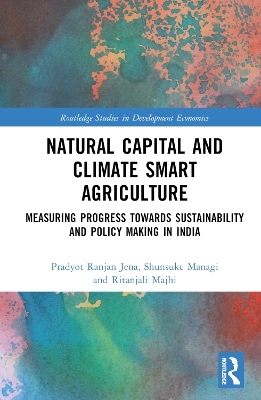
Natural Capital and Climate Smart Agriculture
Routledge (Verlag)
978-1-032-26904-7 (ISBN)
- Noch nicht erschienen (ca. Januar 2025)
- Versandkostenfrei
- Auch auf Rechnung
- Artikel merken
The book looks at how agricultural sector can become more climate resilient to ensure food security and human capital development. It also suggests a policy framework toward climate resilient agricultural development. It outlines determinants of climate smart agricultural practices and their impact on agricultural yield, biodiversity, and food security and as well as outreach activities for wider collaboration from around the world.
This book will interest those who are researching on accounting natural capital impacts of climate resilient agriculture and 2030 SDGs.
Pradyot Ranjan Jena is Professor at the National Institute of Technology Karnataka, Surathkal, India. Shunsuke Managi is the Distinguished Professor of Technology and Policy and Director of Urban Institute at the Kyushu University, Japan. Ritanjali Majhi is Professor at the National Institute of Technology Karnataka, Surathkal, India.
About the authors
Preface
Acknowledgements
Chapter 1 -- Natural Capital in India: An Overview of Trends and Status of Natural Capital Stock
1.1. Natural Capital: A Brief History
1.2. Natural Capital: Indian Context
1.3. Agricultural Land Holdings
1.4. Forest And Fisheries
1.5. Renewable Energy
1.6. Coal And Minerals
1.7. Natural Capital: Issues Of Sustainability
CHAPTER 2 -- Measurement of Economic Damages of Climate Change Without Suitable Adaptation Strategies
2.1. Introduction
2.2. Implications of Climate Change Vulnerability to Agriculture
2.3. Climate Change in Developing Countries: Indian Context
2.4. Impact of Climate Change on Agricultural Sector: A Case Study
2.5. Methodological Issues
2.6. Impact of Climate Change on Net Revenue
2.7. Impact of Climate Change on Crop Yields
2.8. Mapping Districts in the Scale of Climate Change Vulnerability
2.9. Adaptation Measures Essential to Deal with Climate Change
CHAPTER 3 -- An Overview of Government Policies and Strategies on Climate Smart Agriculture in India
3.1. Introduction
3.2. Adaptation vs Adoption
3.3. Climate Smart Agriculture in India
3.4. The Empirical Literature on the Adoption of CSA Practices and its Determinants
3.5. Access to Extension Services
3.6. Socioeconomic Characteristics
3.7. Experience/Perception of Climate Change
3.8. Attitude and Behaviour towards Risk
3.9. Farm Characteristics
CHAPTER 4--Incentives and barriers in adoption of climate-smart agriculture: Role of government and non-government organization to scale up CSA
4.1. Socio-economic Vulnerability and Climate Smart Agriculture
4.2. Materials and Methods
4.3. Description of the Variable
4.4. Results and Discussion
4.5. The Broader Context
CHAPTER 5 -- Role of Gender in Adopting Climate Smart Agriculture Practices
5.1. Women at the Forefront of Climate Effect
5.2. Evidence on Effects of Climate Change on Gender
5.3. Methodology
5.4. Livelihood and Food Security Issues
5.5. Exposure to Climate Hazards and Impact on the Livelihood
CHAPTER 6 -- The Impact of CSA Technology Adoption on Natural Capital
6.1. Introduction
6.2. Natural Capital and Its Interaction with Agriculture and Climate Change
6.3. Integration of Climate-Smart Agriculture and Natural Capital
6.4 Some effective CSA techniques and their impact
6.5. Case Studies: Implementation of CSA and Its Benefits
6.6. Climate Finance for Conserving Natural Capital in India
6.7. National Policy and Programs for CSA and Natural Capital Conservation
6.8. Policy and Institutional Barriers to CSA and Natural Capital Conservation
6.9. Conclusion
CHAPTER 7 – Impact of CSA Practices on Household Income and Agricultural Yield
7.1 Introduction
7.2. Materials and Methods
7.3 Results and Discussion
7.4 Discussion
7.5 Conclusion and Policy Implication
CHAPTER 8 -- Forest Ecosystems in India and Linkage to Agricultural Sustainability
8.1 Introduction
8.2 Complementarity Between Forest Ecosystem and Sustainable Agriculture: The Linkages
8.3 Preservation of the Indian Forest Ecosystem: Assessing Conservation Efforts
8.4 The Legislation on Forest Conservation and Forest Ecosystem
8.5. Conclusion
| Erscheint lt. Verlag | 28.1.2025 |
|---|---|
| Reihe/Serie | Routledge Studies in Development Economics |
| Zusatzinfo | 37 Tables, black and white; 29 Line drawings, black and white; 3 Halftones, black and white; 32 Illustrations, black and white |
| Verlagsort | London |
| Sprache | englisch |
| Maße | 156 x 234 mm |
| Themenwelt | Sozialwissenschaften ► Soziologie ► Spezielle Soziologien |
| Wirtschaft ► Volkswirtschaftslehre | |
| Weitere Fachgebiete ► Land- / Forstwirtschaft / Fischerei | |
| ISBN-10 | 1-032-26904-9 / 1032269049 |
| ISBN-13 | 978-1-032-26904-7 / 9781032269047 |
| Zustand | Neuware |
| Haben Sie eine Frage zum Produkt? |
aus dem Bereich


